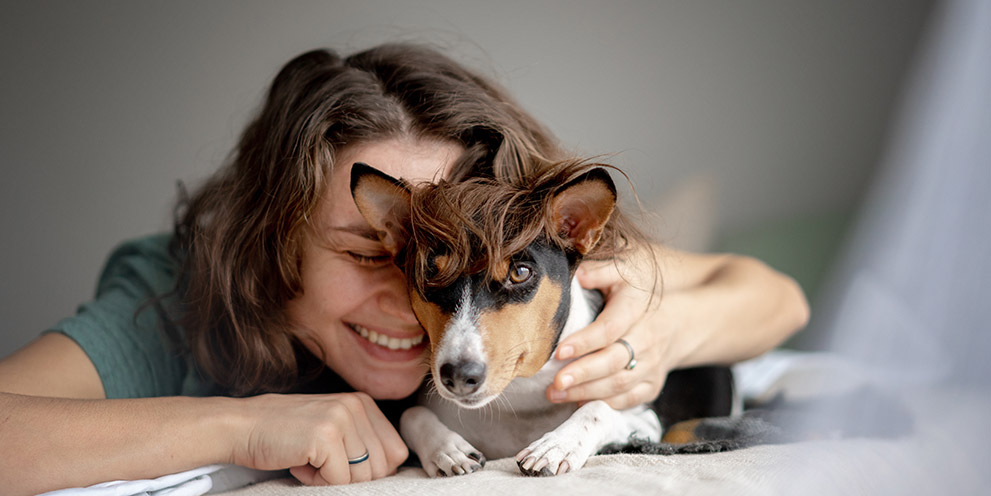What’s covered?
Our dog insurance is here to help.
Choice of vet fee limits
With our different levels of cover, you can pick the right vet fee limit for you and your dog. That means if they’re injured or become ill, you’ve got a safety net.
Help with medication costs
Your cover includes medication costs your vet prescribes.
Physiotherapy and more
We'll cover treatments like physiotherapy and homeopathy if they’ve been recommended by your vet.
We can settle most vet bills directly
Saving you the hassle and expense of upfront payments, if your vet agrees.
Emergency boarding
Boarding your dog at a kennel or cover for pet-minding fees if you need emergency medical treatment.
Pets abroad
Treatment if your dog falls ill or injures themselves abroad. We can cover them for up to 3 trips lasting up to 60 days each.
Farewell cover
The cost of putting your dog to sleep when it’s time to say goodbye.
Third party liability
If your dog injures someone or causes damage to someone else’s property.
Already got pet insurance with us?
Visit our existing customer page to find out how to make changes to your policy. You can also read our FAQs for answers to some key questions.
Choose from our 3 cover levels
Basic, also known as Time Limited:
- Cover for each new accident or illness within a set period you’ve agreed to (usually a year)
- This will be until your vet fee limit has been used up or until your pet's had 12 months of treatment, whichever is first
Classic, also known as Maximum Benefit:
- Covers vet fees up to your chosen limit for each new accident or illness
- If you renew your policy without a break in cover, there’s no time limit for when you can use your vet fee limit
Premier, also known as Lifetime cover:
- Covers vet fees up to your chosen limit for each new accident or illness
- If you renew your policy without a break in cover, the vet fee limit resets each year
Compare our dog insurance cover levels
Basic (Time Limited) |
Classic (Maximum Benefit) |
Premier (Lifetime) |
|
|---|---|---|---|
|
Vet fees limit for each accident or illness - choose which limit works for you |
£1,500 or £3,000 |
£4,000 or £8,000 |
£1,000, £2,000, £4,000 or £6,000 |
|
Access to FirstVet |
|
|
|
|
Accident cover |
|
|
|
|
Third party liability |
|
|
|
|
Accidental damage |
|
|
|
|
Emergency boarding |
|
|
|
|
Loss and found cover |
|
|
|
|
Pets abroad cover (up to 60 days) |
|
|
|
|
Complementary treatment cover |
|
|
|
|
Farewell Cover |
|
|
|
|
Dental – accident |
|
|
|
|
Dental – illness* |
|
|
|
*Dental care up to £2,000. Your pet must have a dental check every 12 months.
You’ll be covered in the following situations:
- For teeth or gums that have been damaged in an accident
- If an underlying illness causes tooth decay or gum disease
- To remove teeth to treat an illness that is not gum disease or tooth decay
What isn’t covered?
There are some things our pet insurance doesn’t cover, including:
- vaccinations
- spaying or castration
- flea or worming treatments
- grooming
- microchipping
It’s also important to know you can’t make a claim for any illness that happens within the first 14 days of your policy starting, or any accidents within the first 48 hours.
Here’s a link to our policy documents for the full list of exclusions and limits.
Getting your dog insurance quote
We just need a few details about you and your dog, including:
About your dog
- Name
- Age
- Gender
- Breed
- Whether they've been spayed or neutered
- Any pre-existing conditions
- Their purchase or donation price
Your personal information
- Name
- Date of birth
- Home address
- Email address
- Phone Number
- The date you'd like your policy to start
Get a dog insurance quote
Why it's worth getting dog insurance


Experts rate our Premier insurance highly
Our Premier £2,000, £4,000 and £6,000 pet insurance have Defaqto’s highest 5 Star rating.
15% discount for additional dogs
If you have more than one dog at home, you could save time and money by insuring them on the same policy. With our multi-pet policy you'll get a 15% discount for each dog you insure.
Your dog is unique, which is why we give personalised quotes depending on your dog and their needs. There are a few things that will impact the cost of your insurance:
- Age – as your dog ages, they are more likely to get ill or injured. This can affect how much it costs to insure them.
- Breed – some dog breeds are more likely to get ill or suffer an injury, which can cause your dog insurance cost to vary.
- Cover – MORE THAN dog insurance offers three different cover level options to choose from, which can vary in cost.
- Claims – if you need to make a claim on your dog insurance, your renewal price may increase as a result.
No - MORE THAN dog insurance doesn’t cover neutering or spaying.
Yes, MORE THAN don't have an upper age limit for dogs.
However, pet insurance for dogs over nine years old can be more expensive. Like us, pets are more likely to get ill as they get older, which means your price may increase over time.
Once your dog turns nine years old, you won't be able to claim for any costs related to them passing away because of illness.
Also, at your first renewal after your pet's ninth birthday, you'll need to start paying a mandatory co-insurance amount. We'll send you more detailed information on what that'll be closer to the time.
We insure a wide range of dog breeds. If your dog is on our breed list, we’ll likely be able to cover them.
We don’t insure the following dogs, whether they’re pedigree, cross or mixed breed:
- Pit Bull (including all derivatives such as XL Bully, Bully, and pocket Bully)
- Pit Bull type
- Japanese Tosa
- Fila Brazileiro
- Dogo Argentino
- Wolf or Wolf hybrid
If you have a cross or mixed breed dog, please check that all the mixes or both crosses are on our breed list. If you can't find them, please contact us to check whether we can cover your pet.
For any other breed that you can't see listed, please ask us as without our agreement you won’t be covered.
When buying a pet insurance policy, you might qualify for more than one of our discounts.
You don’t need to do anything - we’ll automatically apply any discounts to your final quote.
Applying them consecutively means we’ll apply the discounts one at a time.
You can still get pet insurance with MORE THAN, but it won’t cover pre-existing conditions.
These are any health issues which had already developed before you took out your policy – or which had already shown signs of developing.
For instance, your vet thinks your dog may have an illness, but they haven’t formally diagnosed them yet as you’re waiting on test results.
